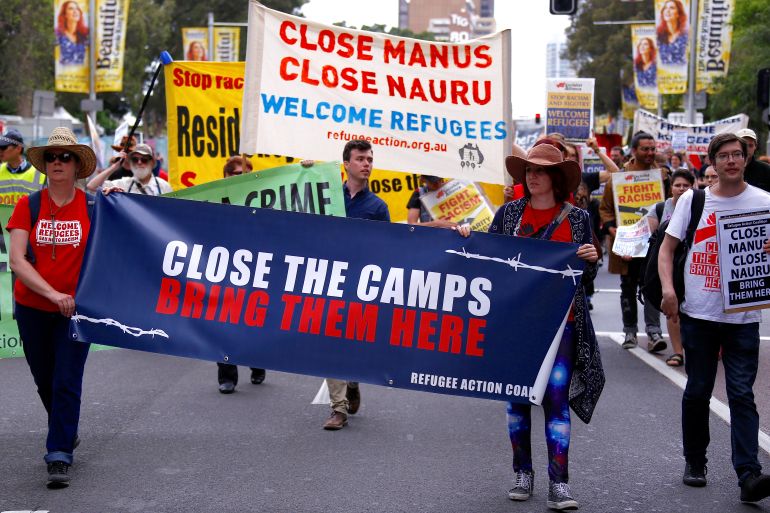New Zealand to take 450 refugees from Australian detention
Refugees who tried to get to Australia by boat have spent years on remote islands or held in immigration detention, damaging their mental health.

New Zealand has announced it will take in 450 asylum seekers and refugees held in Australia or its offshore detention centre in Nauru under Australia’s hardline immigration policy, nine years after its first offer was rejected.
Many of the refugees have been detained for years with no hope of being able to live normal lives in Australia.
Keep reading
list of 4 items‘I asked for protection and they abused me over and over’
Beyond the Park Hotel: Australia’s immigration detention network
Djokovic row highlights plight of asylum seekers in Australia
“New Zealand has a long and proud history of refugee resettlement and this arrangement is another example of how we are fulfilling our humanitarian international commitment,” said New Zealand’s Minister for Immigration Kris Faafoi. “We are pleased to be able to provide resettlement outcomes for refugees who would otherwise have continued to face uncertain futures.”
Australia introduced harsh new measures in 2013 to send any asylum seekers who tried to arrive in Australia by boat to so-called offshore processing centres in Papua New Guinea (PNG) or Nauru. They were told they would never be allowed to settle in Australia even if they were found to need protection under refugee law. Refugee groups say about 1,300 people, including people allowed to live on temporary visas in the community, currently fall under the category.
While the camps in PNG and Nauru have closed, about 200 people remain in the Pacific while others were brought to Australia under a short-lived medical evacuation scheme in 2019 and have been living in facilities such as Melbourne’s Park Hotel ever since.
New Zealand says it will take 150 refugees a year over the next three years and follow the same screening and Refugee Quota Programme assessment process used for other refugees coming into the country, the statement said.
Refugees held in detention have long complained about the arbitrary nature of the system, with Australian officials holding sweeping powers over their fate.
Moz Azimitabar was freed from immigration detention in 2021 on a bridging visa that allows him to work, but not study, and has to be renewed every six months. On Thursday, he welcomed the New Zealand announcement.
“Today is an incredible victory for human rights & shows that the Govt cannot ignore people power!” he wrote on Twitter. “Today is my birthday and this is the best present ever!”
New Zealand first offered to take some of the refugees in 2013, but was repeatedly rebuffed by Australia, which later negotiated on the refugees with the United States.
The US has taken in just less than 1,000 people from the processing centres, according to January data from the Refugee Council of Australia.
Critics have condemned Australia’s treatment of refugees and the conditions in its detention facilities, and a public outcry at the health impact of prolonged detention led to some being medically evacuated to Australia from the Pacific islands.
The latest agreement does not include anyone in PNG, according to a statement issued by Australia.
“Offshore detention is a dark and bloody chapter in our country’s story, and its bipartisan foundation is a national shame,” Nick McKim, a senator for the Greens from the island of Tasmania, wrote on Twitter. “It took far too long for the Australian government to accept NZ’s offer, and the agreement should have provided resettlement for more people, more quickly.”
The government continues to insist the policy has deterred people from making dangerous sea journeys to get to its shores, and that anyone who tries to do so will not be allowed to stay.
“The arrangement does not apply to anyone who attempts an illegal maritime journey to Australia in the future,” Minister for Home Affairs Karen Andrews said in a statement.
“Australia remains firm – illegal maritime arrivals will not settle here permanently. Anyone who attempts to breach our borders will be turned back or sent to Nauru.”